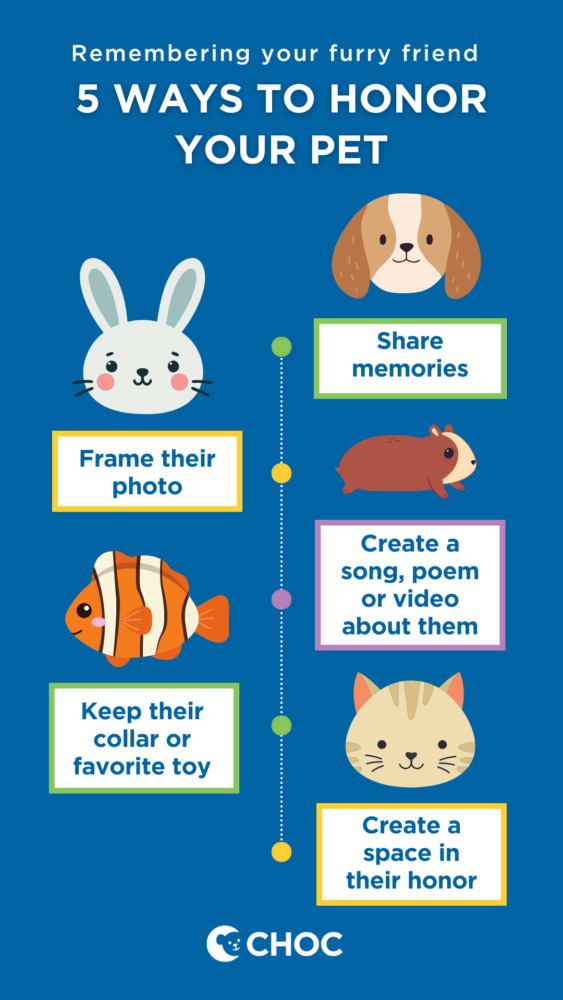How to help your child grieve the loss of their pet
By Miranda Wichelns, licensed clinical social worker at CHOC, certified grief specialist
Pets are cherished family members. The heartbeat at our feet, the warm spot on our lap, the joyful greeting at the door whether we are coming back from a long trip or just coming out of the bathroom. They are always there, with unconditional love and constant, comforting companionship.
Their soothing presence is grounding throughout the daily stresses of life, whether enormous or small. The connection between a pet and their person is incredibly deep and reliable, and serves as an in-the-moment, immediate comfort.
For a child, the death of a pet may be the first time they are experiencing the death of a loved one, and their first time experiencing grief. A pet may be like a sibling or a best friend to a child, perhaps there for the child’s whole life or their formative years.
Your family’s daily routine may be jarringly altered without the daily rituals of walks, meals, playtime and companionship throughout so many areas and milestones of life.
Signs of grief in kids and teens when coping with the loss of a pet
After a pet dies, you may notice some changes in the way that your child acts as they try to cope with their grief. These changes may include some of the following:
- Young children may not understand that death is permanent and may repeatedly ask the same questions or be very curious about what happened to their pet.
- You may notice that your young child might temporarily lose skills they’ve mastered, like dressing themselves.
- Grieving children and teens may have changes in their eating and sleeping patterns and their energy levels.
- You may notice that your child has difficulty focusing on tasks or mood swings.
- Grieving children may be clingier than they were before, whereas teens may be more reserved in showing their emotions.
- Grieving children and teens may experience many different emotions, including sadness, irritability, fear, frustration, or numbness. Others may have little emotional reaction at all. Teens may be hard on themselves, judging their emotional reactions negatively, for example feeling that they are “a mess” or “should” be strong, “over it,” etc. They may experience strong emotions or have behavior outbursts about situations that seem minor to you.
- Grieving children and teens may feel regret about how they treated their pet or if they did not have a chance to say goodbye.
Activity ideas to comfort kids after the loss of a pet

 Print this to share with your kids
Print this to share with your kids
Here are some ideas for activities that can be comforting and meaningful for your child and your family, to memorialize your pet:
- Gather to honor and celebrate your pet’s life. Whether it is soon after the pet’s death or after some time has passed, consider having a ritual, such as gathering in a place that was special for the pet, or for your family, or in a special place your child chooses. Everyone can share memories and reflections about the pet and what they meant to them.
- Have your child choose their favorite pictures of their pet and frame them.
- Write down special memories of the pet and place them in a jar or in the pet’s food or water dish.
- Hang an ornament with their pet’s name, picture or pawprint on the Christmas tree.
- Create a scrapbook, poem, song or video to capture memories and express how they feel.
- Plant a tree or a garden. Placing a painted rock, a plaque or a statue with the pet’s name there.
- Allow your child to choose and keep mementos of their pet like their collar, a toy, etc. if they would like.
How to help your child cope with grief after losing a pet
Here are some additional strategies to support your child in coping with their grief:
Practice clear communication
While it may be natural to want to shield your child from sad, difficult situations, honesty is important for many reasons. Telling your child that the pet “ran away” or “went on a trip” may be distressing when your child learns later that their pet died.
Telling your child that the pet was “put to sleep” or “crossed the rainbow bridge” may sound comforting to you, but those statements can be confusing, and potentially scary, for kids.
Instead, tell your child what happened, using clear, developmentally-appropriate language. Invite their questions, and answer them truthfully.
For example, “Maggie had a disease called cancer that caused her to have pain. You can’t catch cancer from pets or from people. She was weak and losing weight because fighting cancer used up her energy. When a pet is in pain, it is very stressful for them. Our family and our vet did everything we could to help her, but she was not going to get better. Our vet gave her a special medicine to help her fall asleep and make her heart stop beating once she was asleep. That is different than regular sleeping, and it didn’t hurt her. It was a kind way to take her pain away. When her heart stopped beating, her body stopped working, and she died. She isn’t in pain anymore, but we are very sad because we love and miss her.”
Honesty shows it is not wrong to talk about death or painful feelings, which will help your child cope with other losses in the future.

Mental Health Education Program (MHEP) webinars
Care for yourself
One of the most loving, most helpful ways to support your child in their grief is to care for yourself in your grief, too.
Explain your feelings, share your memories, and model compassionate self-care practices to teach your child that we all feel painful things, we honor our feelings and our grief, and we take care of ourselves and each other to get through it in the best ways we can.
Channel your grief into good
Your family might consider donating some of your pet’s unused food, toys or beds to your local animal shelter to help other animals. Pick up litter along a trail where you used to walk your pet. Raise money or volunteer for a cause that supports animals.
Read books together
Here are some books to support children grieving a pet:
- Goodbye, Brecken by David Lupton
- Heart Dog: Surviving the Loss of Your Canine Soul Mate by Roxanne Hawn
- Goodbye, Mousie by Robert H. Harris
- Ida, Always by Caron Levis
- The Tenth Good Thing About Barney by Judith Viorst
- Remembering Blue Fish by Becky Friedman
- Jasper’s Day by Marjorie Blain Parker
- Kate, the Ghost Dog: Coping With the Death of a Pet by Wayne L. Wilson
For more information about supporting a child who is grieving, please visit CHOC’s guide to coping with grief.
I hope these ideas may be helpful and comforting to your child during this difficult time, and to you while supporting your child. Lastly, if you are reading this article, I want to honor that you may be going through grief of a pet yourself; my heart goes out to you.
May the knowledge that your pet experienced great love from you, your child and your family throughout their life be of some solace in this very painful time.
Get more expert health advice delivered to your inbox monthly by subscribing to the KidsHealth newsletter here.
Get mental health resources from CHOC pediatric experts
The mental health team at CHOC curated the following resources on mental health topics common to kids and teens, such as depression, anxiety, suicide prevention and more.





